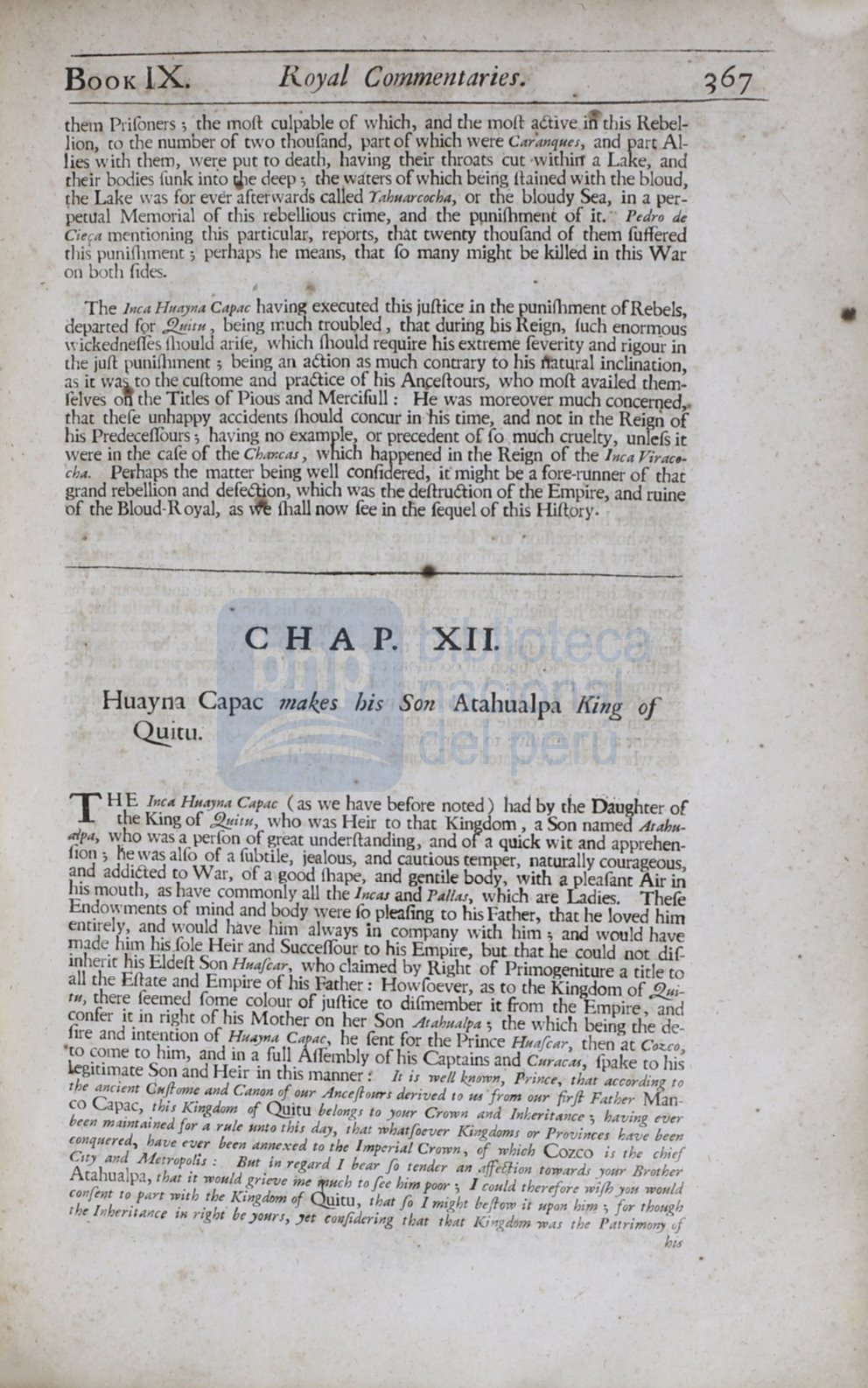

BooK
IX~
Royal
Commentaries. ·
them Prifoners; the mofi: culpable of which,
a~d
the moil: active
in
this Rebel–
lion,
ro
rhe number of two thoufand, part of
~hich
were
Caran_qu~s,
and
pare
Al–
lies with them, wer.e put to death, having their
~hroa~
cut
,~1thll1.
a Lake, and
cheir
bodies
funk
into 1e deep ; the .waters ofwhich bemg
Hamed
with
d~e
bloud,
the Lake was for ever afterwards called
Tahuarcocha,
or
t~e blo~dy S~a,
m a per–
petual Merno:ial
o~
this r.ebellious crime, and the ppn1fhment
of
It.
Pedro de
Ciera
mentionmg chis particular, reports, that twenty :houfand .of.
t~em ~offered
this puni01ment; perhaps he means, that
fo
many might be killed m thIS War
on both fides.
The
Jnca Huayna Capac
having executed this
julHc~
_in
t~e pu~ifhrnent
ofRebels,
departed for
~itu,
being much troubled ,
t~ac
qunng
bis
Reign,. fuch
en.ormo~s
w
ickednelfes !hould arife, which fl:10uld require his extreme feventy
a~d r~gou_r
m
che jufi punHhment · being an aCtion as much contrary to hIS ruuural mcllilatton,
as it w
to the cufl:dme and praetice o.f his Atl}:efi:ours, who moll: availed them–
felves o the Titles of Pious and Mercifull : .He.
w~s
moreover
~uch conc~rqed,
that thefe unhappy accidents fhould concur m his urne, and
~ot
m the Reign
C!f
his Predeceffours ; having no example, or precedent of fo much cruelty, unlefs It
were in the cafe of the
Chancas,
which
happene~
in
~he
Reign of the
Inca
Yirae1~
cha.
Perhaps the matter being
w~ll
confidered,
1t
m.ight be a fore-n;inner of
t~at
grand rebellion and defection, whICh
was
the dell:ru6hon of the Empire, and rame
of the Bloud-Royal, as
fhall
now fee in the fequel of this Hifiory.
CH AP.
XII.
Huay11a Capac
makes
his
Son
Atahualpa
King of
~itu.
T
HE
Incte Huayna Capac
(as
we have before noted)
had
by the Daughter of
·
theKing of
~itu,
who was Heir to that Kingdom , a Son named
Atahu-
nl.pa, w.howas a perfon of great underfranding, and of a quick wit and apprehen–
fion; he was alfo of a fubtile, jealous, and cautious temper, naturally courageous,
and addieted to War, of a good fhape, and gentile body, with a pleafant
Air
in
his mouth, as have commonly all the
lnca1
and
Pallas,
which are Ladies. Thefe
Endowments of mind and body were
fo
pleafing to his Father, that he loved him
entirely, and would have him always in company with him; and would have
made him hisfole Heir and Succe!four to his Empire, but that he could not
dif–
inherit his Eldefl: Son
Huafcar,
who claimed by Right of Primogeniture a tide to
all the Efiate and Empire of his Father: Howfoever, as to the Kingdom of
.fl.t!i–
tu,
ther~
(eeo:ied
forn~
colour of jufrice to difmember
it
from the Empire, and
confer
1t
m
right
of his Mother on her Son
Atahualpa
;
the which being the de–
ftre and intention of
Hutl.Jna
Capac,
he fent for the Prince
Huefcar,
then at
c~co.,
to come to him, and in a full Alfembly of his Captains and
CuracM,
fpake to his
1.egitin:are Son and
He~
·
n this
ma~mer
:
It i's well kpown, Prince, that according to
the ancient C11ftome and Canon of our Ancejlours derived
tom
from our firft Father
Man–
co
Cap~c,
.this Kingdom of
Qgj~u
belongs to your Crown and lnheritttnce; having ever
been maintained for a rule unto thts day, that whatfoever Kingdoms or ProvinceJ htf,ve been
conquered,
have
ever been annexed to
the
Imperial Crown, of wbioh
Cozco
is the chief
City and
Metrop~Li.r
:
But. in regard I bear
fa
tender an .-ijfeElion to-wards _your Brother
Atahualpa,
that.'t would ;;r1eve me !fu_ch to fee him poor; I could therefore
wijh
you would
con{ent to. part w_irh .the.Kingdom of
l..h!itu,
that
fa
I might be/fow
it
upon hi"!
;
for though
th~
Inheruance
in nght be yo11rs, .Jet confidering that that Kingdom was the
Patrimo~
ef
-.
hi&-














